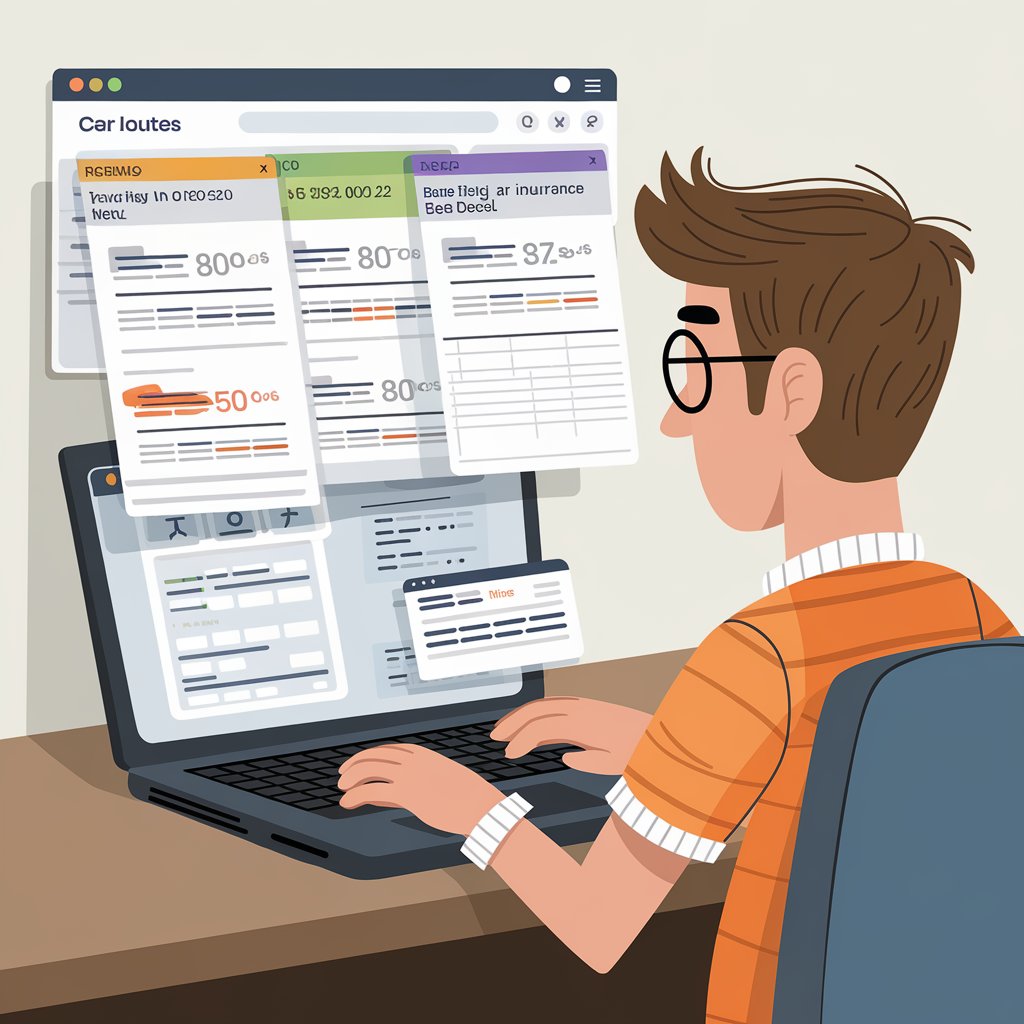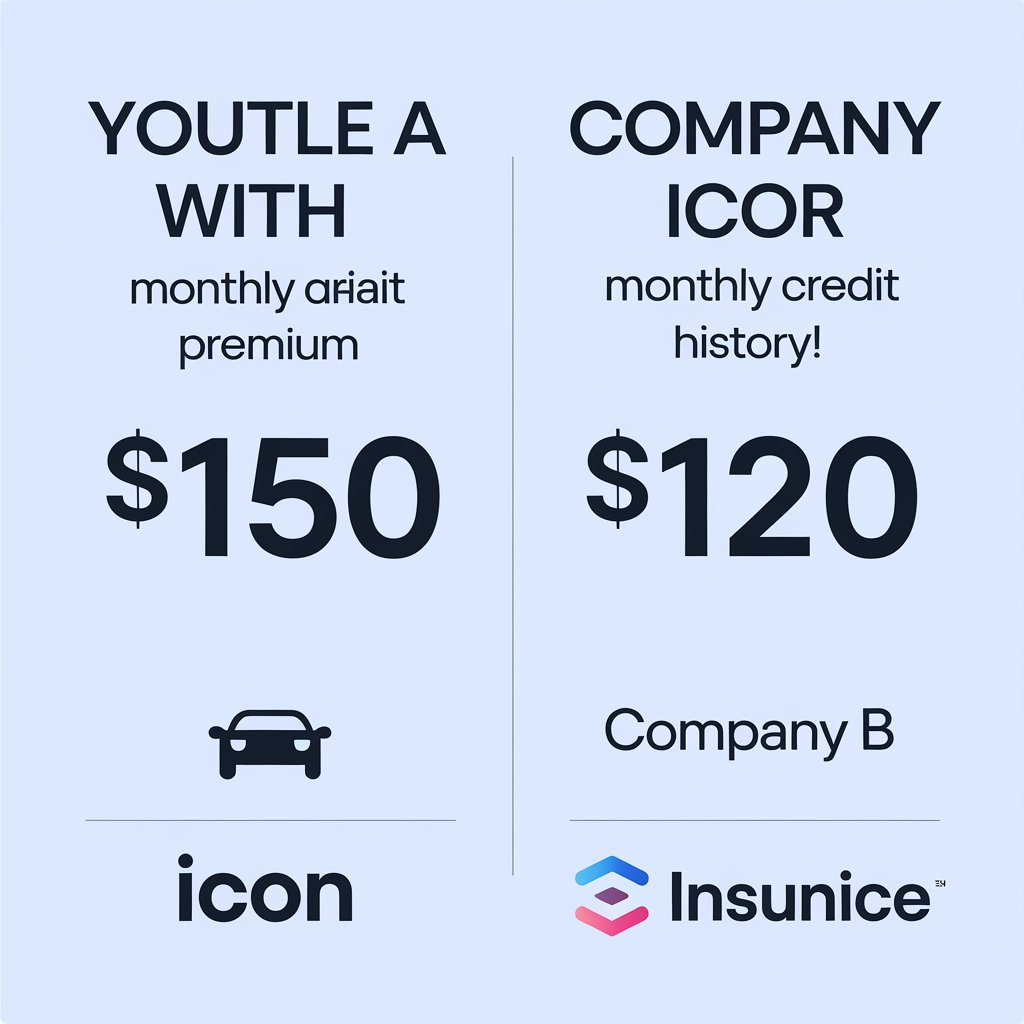Why Credit History Matters in Car Insurance
When it comes to determining car insurance premiums, many factors are considered, including the driver’s age, driving experience, vehicle type, and—perhaps surprisingly—credit history. Insurance companies believe that a driver’s credit score can give insight into how financially responsible they are, and by extension, how likely they are to file claims.
Insurance Companies’ Reliance on Credit History
Insurance providers often use what’s called a “credit-based insurance score” to assess the likelihood of risk. If someone has a good credit score, they’re seen as more responsible, resulting in lower premiums. On the flip side, having no credit history—or a bad one—can make a driver seem riskier, leading to higher premiums. This can be especially unfair for young drivers who simply haven’t had the time or opportunity to build a credit profile yet.
The Impact of No Credit History on Car Insurance
For young drivers with no credit history, insurance companies may assume that the lack of credit means they are a higher risk. This assumption is based on general statistical trends that show drivers with poor or no credit are more likely to file claims. As a result, these drivers can expect to pay higher premiums compared to those with established, good credit scores.
Why Young Drivers Are Considered High-Risk
In addition to the lack of credit history, young drivers are already considered high-risk due to their inexperience on the road. Statistically, younger drivers—especially those under 25—are more likely to be involved in accidents. When this inexperience is combined with a lack of credit history, it can make it difficult for young drivers to find affordable car insurance.

Factors That Increase Premiums for Young Drivers
Several factors contribute to higher premiums for young drivers, especially those without credit history. Some of the key factors include:
Age and Driving Experience
Young drivers, particularly those under 25, are statistically more prone to accidents. This factor alone leads to higher premiums.
Lack of Credit History
As mentioned earlier, a lack of credit history means the insurance company has no financial background to assess, making them more cautious and leading to higher premiums.
Gender Considerations
In some cases, young male drivers may face higher premiums than their female counterparts due to accident statistics that show young males are involved in more collisions.
Why Credit-Based Insurance Scores Are Used
Credit-based insurance scores are widely used because studies have shown a correlation between financial behavior and driving habits. Insurance companies believe that if a person manages their finances responsibly, they are less likely to engage in risky behavior behind the wheel. This is why having no credit history, while not inherently negative, can still result in higher premiums.
Car Insurance Options for Young Drivers Without Credit History
Although young drivers with no credit history may face challenges in getting affordable car insurance, there are options available:
High-Risk Car Insurance Plans
Some insurers specialize in high-risk drivers and offer tailored plans for those without credit history. These plans may come with higher premiums but can still provide essential coverage.
State-Funded or Government-Backed Insurance
In certain states, government-backed programs offer insurance options for drivers who are considered high-risk or have no credit history.
Alternatives to Traditional Insurance
Usage-based insurance is another option. It’s based on driving behavior rather than credit history, allowing young drivers to lower their premiums by demonstrating safe driving habits.
Insurance Providers Catering to Young Drivers
While most major insurance companies offer plans for young drivers, some companies specialize in providing coverage for those with little or no credit history. Providers like Geico, Progressive, and State Farm offer flexible policies that cater to younger drivers.
Features to Look for in a Policy for No-Credit Drivers
When searching for car insurance, young drivers without credit should look for certain features that can help keep costs down:
- Flexible Payment Plans: Insurers that offer monthly payment options can make insurance more affordable.
- Usage-Based Insurance: Policies that track driving habits can lower premiums based on how safely you drive.
- Discounts for Good Driving: Many insurance companies offer discounts for completing defensive driving courses or maintaining a clean driving record.
Strategies for Lowering Car Insurance Premiums
Even without credit history, young drivers can take steps to lower their car insurance premiums:
Improve Your Driving Record
Avoiding accidents and traffic violations will help you maintain a clean driving record, which can lead to lower insurance rates over time.
Take Defensive Driving Courses
Some insurers offer discounts for completing an accredited defensive driving course, which helps demonstrate your commitment to safe driving.
Bundle Insurance Policies
If possible, bundling multiple insurance policies, such as home and auto insurance, can provide discounts that reduce overall premium costs.
The Importance of Comparison Shopping
Comparison shopping is one of the most effective ways to find affordable car insurance. There are several online tools that allow you to compare quotes from different providers instantly. Alternatively, speaking to an independent insurance broker can help you find the best policy for your specific needs.
Car Insurance for Young Drivers in Different States
Car insurance premiums vary significantly by state, and some states are more lenient when it comes to credit history. States like California, Massachusetts, and Hawaii have restrictions on using credit scores to determine insurance rates, which can be beneficial for young drivers.
Legal Protections for No-Credit Applicants
Certain states have laws in place that limit the use of credit scores in determining car insurance premiums. Young drivers in these states may find it easier to get affordable coverage even without credit history.
How to Build Credit as a Young Driver
Building credit from scratch can help young drivers improve their financial standing and lower their insurance premiums in the long run. Here are some simple ways to start building credit:
Secured Credit Cards
A secured credit card is one of the easiest ways to build credit. It requires a small deposit but functions like a regular credit card, allowing you to build a credit history through regular, on-time payments.

Outline
H1: Introduction
- Importance of car insurance for young drivers
- Challenges faced by young drivers without a credit history
H2: Why Credit History Matters in Car Insurance
- The role of credit score in determining premiums
- Insurance companies’ reliance on credit history
H2: The Impact of No Credit History on Car Insurance
- Understanding how no credit history affects insurance rates
- Why young drivers are often considered high-risk
H3: Factors That Increase Premiums for Young Drivers
- Age and driving experience
- Lack of credit history
- Gender considerations
H3: Why Credit-Based Insurance Scores Are Used
- Linking financial responsibility to driving behavior
- Statistical relevance in risk assessment
H2: Car Insurance Options for Young Drivers Without Credit History
- High-risk car insurance plans
- State-funded or government-backed insurance options
- Alternatives to traditional insurance plans
H3: Insurance Providers Catering to Young Drivers
- Major insurance companies with policies for young drivers
- Smaller providers that specialize in no-credit or low-credit drivers
H3: Features to Look for in a Policy for No-Credit Drivers
- Flexible payment plans
- Usage-based insurance
- Discounts for good driving behavior
H2: Strategies for Lowering Car Insurance Premiums
- How to improve driving records
- Taking driving courses to reduce risk perception
- Bundling insurance policies for discounts
H3: The Importance of Comparison Shopping
- Using online tools to compare quotes
- Talking to insurance brokers
- The role of independent agencies
H2: Car Insurance for Young Drivers in Different States
- States with no-credit-history policies
- Regional variations in insurance premiums
H3: Legal Protections for No-Credit Applicants
- States that limit credit score usage in insurance
- Consumer rights for young drivers
H2: How to Build Credit as a Young Driver
- Tips for starting a credit history
- Secured credit cards and small loans
H3: Long-Term Benefits of Establishing Credit
- Better rates and financial options in the future
- Reducing insurance premiums over time
H2: Conclusion
- Summary of challenges and options for young drivers with no credit history
- Final tips for finding affordable car insurance
H2: FAQs
- Why do young drivers without credit history pay more for car insurance?
- What are the best car insurance options for young drivers with no credit history?
- Can young drivers build their credit history through car insurance?
- Are there any insurance companies that do not consider credit scores?
- How can I lower my car insurance premiums without credit history?
Introduction
Car insurance is an essential investment for all drivers, but it can be especially challenging for young drivers who are just starting their driving journey. For young drivers without a credit history, this challenge becomes even more pronounced. Insurance companies often rely on credit scores as one of the key factors to determine premiums, which can put young drivers at a disadvantage.
In this article, we’ll explore how car insurance works for young drivers with no credit history, compare different options available to them, and offer tips on how they can get affordable insurance even without an established credit score.
